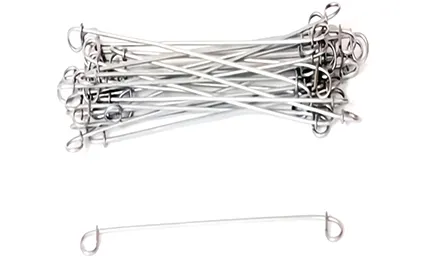-
 Phone:
Phone: -
 Email:
Email:

Does rebar tie wire corrode and affect structural integrity in construction projects
Does Rebar Tie Wire Rust?
Rebar tie wire, a crucial component in the construction and reinforcement of concrete structures, plays a significant role in securing rebar in place. Understanding the properties of rebar tie wire, including its susceptibility to rust, is essential for ensuring the longevity and safety of a construction project.
What is Rebar Tie Wire?
Rebar tie wire is a type of wire used in construction to hold steel reinforcement bars (rebar) together. It is typically made from low-carbon steel, which provides a good balance of strength and flexibility. The wire is used to create a framework that reinforces concrete, adding tensile strength to the otherwise brittle material. When concrete cures, the rebar and tie wire ensure that the structure can withstand tensile forces, making it less likely to crack or fail under pressure.
The Issue of Rusting
One of the significant concerns with steel materials in construction, including rebar tie wire, is rust. Rusting is a chemical process that occurs when iron or its alloys, like steel, react with oxygen and moisture over time. This reaction leads to iron oxide formation, commonly known as rust, which can weaken the metal, compromising its structural integrity.
Factors Contributing to Rust Formation
Several factors can contribute to the rusting of rebar tie wire
1. Environmental Conditions High humidity, acidic precipitation, and exposure to salt (particularly in coastal areas) can accelerate the rusting process. This is especially crucial in regions where construction takes place in harsh weather conditions.
2. Quality of Material The type of steel used in the production of rebar tie wire can influence its rust resistance. Lower quality steels may have less corrosion resistance, making them more susceptible to rust.
does rebar tie wire rust

3. Protective Coatings Some manufacturers apply coatings to rebar tie wire to enhance its corrosion resistance. These coatings can include zinc galvanization or other rust-proof treatments. However, if these coatings are damaged during installation, the underlying wire can be exposed to the elements, leading to rust.
Consequences of Rusting
The presence of rust on rebar tie wire can lead to severe implications for construction projects. Rust can expand, leading to physical damage and weakening of the structure it supports. If the tie wire loses its strength, it can cause the rebar to shift, risking the integrity of the entire concrete structure. For this reason, regular inspections are vital to identify and address any signs of corrosion before they lead to more significant problems.
Preventing Rust on Rebar Tie Wire
To prevent rusting, several measures can be taken
1. Choose High-Quality Materials Opting for high-quality, rust-resistant tie wire can significantly diminish the risk of corrosion.
2. Proper Storage Store tie wire in a dry, sheltered location to minimize exposure to moisture and humidity before use.
3. Use Protective Coatings Employing tie wire with protective coatings can provide an extra layer of defense against rust.
4. Regular Inspections Conducting routine inspections during and after construction can help detect rust early, allowing for timely remediation.
In conclusion, rebar tie wire is an essential element in concrete construction, but its susceptibility to rust poses potential risks. Understanding the causes of rusting and implementing measures to mitigate it is crucial for the longevity and safety of concrete structures. By choosing quality materials, storing them properly, and conducting regular inspections, builders can protect against the harmful effects of rust, ensuring that their projects stand the test of time.
-
Uncompromised Slope Safety with Advanced Rockfall Protection NettingNewsJun.09,2025
-
The Smart Choice of Chain Link FenceNewsJun.09,2025
-
Securing the Future with Time-Tested Barbed Wire ProtectionNewsJun.09,2025
-
Reliable and All-Season Fencing with Premium Hexagonal Wire MeshNewsJun.09,2025
-
High-Performance Binding Solutions with Premium Loop Tie WireNewsJun.09,2025
-
Durable, Flexible, and High-Performance Baling Wire for SaleNewsJun.09,2025
-
Unveiling the Versatility of Hexagonal Wire MeshNewsMay.21,2025








